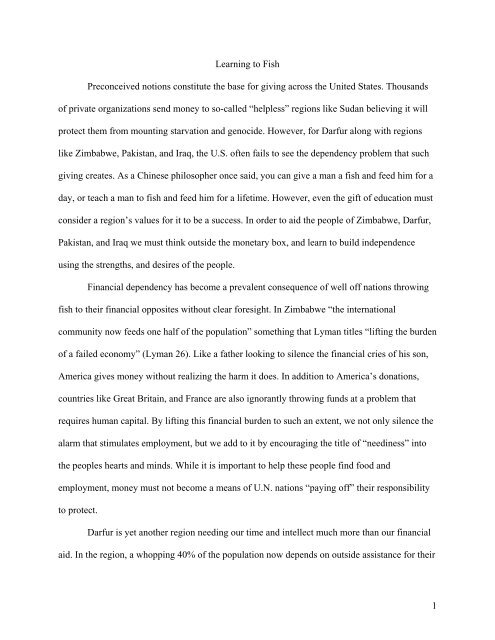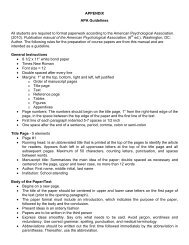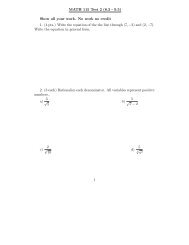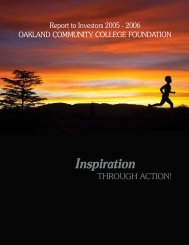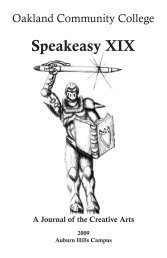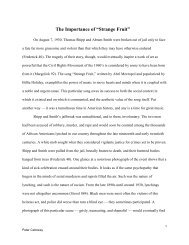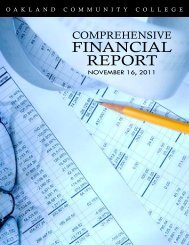Amber Siri .pdf - Oakland Community College
Amber Siri .pdf - Oakland Community College
Amber Siri .pdf - Oakland Community College
Create successful ePaper yourself
Turn your PDF publications into a flip-book with our unique Google optimized e-Paper software.
Learning to Fish<br />
Preconceived notions constitute the base for giving across the United States. Thousands<br />
of private organizations send money to so-called “helpless” regions like Sudan believing it will<br />
protect them from mounting starvation and genocide. However, for Darfur along with regions<br />
like Zimbabwe, Pakistan, and Iraq, the U.S. often fails to see the dependency problem that such<br />
giving creates. As a Chinese philosopher once said, you can give a man a fish and feed him for a<br />
day, or teach a man to fish and feed him for a lifetime. However, even the gift of education must<br />
consider a region’s values for it to be a success. In order to aid the people of Zimbabwe, Darfur,<br />
Pakistan, and Iraq we must think outside the monetary box, and learn to build independence<br />
using the strengths, and desires of the people.<br />
Financial dependency has become a prevalent consequence of well off nations throwing<br />
fish to their financial opposites without clear foresight. In Zimbabwe “the international<br />
community now feeds one half of the population” something that Lyman titles “lifting the burden<br />
of a failed economy” (Lyman 26). Like a father looking to silence the financial cries of his son,<br />
America gives money without realizing the harm it does. In addition to America’s donations,<br />
countries like Great Britain, and France are also ignorantly throwing funds at a problem that<br />
requires human capital. By lifting this financial burden to such an extent, we not only silence the<br />
alarm that stimulates employment, but we add to it by encouraging the title of “neediness” into<br />
the peoples hearts and minds. While it is important to help these people find food and<br />
employment, money must not become a means of U.N. nations “paying off” their responsibility<br />
to protect.<br />
Darfur is yet another region needing our time and intellect much more than our financial<br />
aid. In the region, a whopping 40% of the population now depends on outside assistance for their<br />
1
survival, a number that is not surprising considering Sudan’s history of foreign reliance (Lyman).<br />
In the 1990s Northern Slave traders in Sudan made a killing off capturing men from the south<br />
that Americans paid to set free. However, despite this lesson America continues to fight the War<br />
in Darfur using their checkbooks. Already “100,000 people have died in Darfur” not including<br />
the thousands who’ve been raped and robbed of the aid we’ve sent (Applebome). Just last year<br />
when the Red Cross attempted to bring food and medical supplies, “its convoys where hijacked<br />
and its workers robbed,” proving that the war in Darfur cannot be won by just providing<br />
“supplies” (Preston). It must be done by first teaching Union troops how to organize their<br />
defense, and later sending the necessary financial support.<br />
In Three Cups of Tea Gregg Mortenson’s actions illustrate a process in successful giving,<br />
that is, by studying the people and their ambitions. As any Middle Eastern missionary will tell<br />
you “you’ve got to go there, to know there” (Hurston 119). With a similar mindset, Mortenson<br />
offers aid to Pakistan, by first studying their needs. He sees beyond the society’s stereotypical<br />
“neediness” to find a group of people hungry for education and independence. He sees children<br />
writing outside in the sand because they are too poor for classrooms and supplies, he sees girls<br />
banned from education, and a whole village segregated from society because they are too poor to<br />
build a bridge. But, instead of throwing money at the issue, Mortenson asks why this is, and<br />
confronts each blockade keeping education from the society. He organizes the funds to build the<br />
bridge, and inspires the people to stand up against their corrupted religious officials.<br />
Similarly as America seeks to aid the Middle East we must understand that successful<br />
giving recognizes the cultural ambitions and desires of the people. In the story Three Cups of<br />
Tea, Gregg Mortenson works successfully at bringing equal education to the village of Korphe,<br />
Pakistan .The most successful element of his project is that his purpose uplifts the people’s will<br />
2
to participate. Towards the middle of the story, the village nurmadhar named Haji Ali says to<br />
Mortenson “you need to do one thing: You need to shut up, sit down… and give empowerment<br />
to local villagers" (Relin 150). As Haji Ali explains to Mortenson, allowing the surrounding<br />
society to give birth to the school is crucial because, with their effort; hopes, dreams, and<br />
attachments are built. Today, Mortenson, and many of his followers, have pushed his mission<br />
further north into the heart of Afghanistan. “In 2000 at the height of the Taliban only 800,000<br />
Afghani children were in the school system. Today there are 6 million, 2 million of which are<br />
female” (Lyman 18).This is thanks, in part, to Mortenson’s effort, but more so on behalf of those<br />
minds he taught to fish for education.<br />
Like Mortenson, America must recognize the cries for equal education in the Middle<br />
East, and that it is necessary before equal rights can be swallowed there. In the Islamic culture,<br />
women have been thought of as property for centuries. Thirteen-year-old girls have been given in<br />
marriage to forty-year-old strangers; they have been beaten without rights, and have been<br />
charged as sex offenders for leaving their husbands (Jones 23). In 2003, when Iraq’s government<br />
began reconstruction, half of the seats in the “United Iraqi Alliance” were reserved for women<br />
(Marshal). Not only did violence and protest rise, but even the women elected undermined their<br />
sex’s potential, suggesting laws with “legal preference in the treatment of men” (Marshal).<br />
Though change is necessary, educating Iraq must come first. In an Islamic society where time<br />
often moves at a much slower pace, placing women into seats of power must not strike them like<br />
a gun-shot, but at a steady pace. In her novel Kabul in Winter Ann Jones, a current resident of<br />
Afghanistan, describes how we have “misspent billions of American tax dollars” on similar shot-<br />
gun projects that did not incorporate the desires of the people (Jones 56).<br />
3
Though we often see no educational benefit in going where oppression lies there is much<br />
to learn about cherishing what and who we believe in. As Mortenson illustrates throughout his<br />
journey, living in such a rugged environment teaches us to place the society that protects us,<br />
above and beyond ourselves. Even the influence humility reveals its benefits throughout these<br />
societies. There is a form of stead-fast determination which is unmistakable in the naked eyes of<br />
Pakistani women. These women teach us that sometimes it’s ok to live humbly. That you can<br />
take the time to drink three cups of tea a day, thank God for your blessings, and still be happy in<br />
the poorest circumstances.<br />
In any given society education must come before social organization, just as America<br />
must hear the cries of the Middle East before they can begin to educate them. Just as Mortenson<br />
showed, education is not something that can be set off like a shot-gun or spent like money. In the<br />
end the course of fully aiding a society is like teaching a man to fish, it requires patience.<br />
4
Works Cited<br />
Applebome, Peter. “An Anguished Cry Far Away, Heard Through All the Buzz.” The<br />
New York Times (Nov 28 2004). PA47 col 02: A47. Info Trac Custom<br />
Newspapers. Gale. <strong>Oakland</strong> <strong>Community</strong> <strong>College</strong>. 11 Dec. 2008<br />
.<br />
Hurston, Zora Neale. Their Eyes Were Watching God. New York: Harper Perennial, 2006.<br />
Jones, Ann. Winter in Kabul. New York: Pan Books 2006.<br />
Lyman, Princeton “Beyond Humanitarianism” New York: Atlantic Publishing, 2007.<br />
Marshal, Linda “Betraying Iraqi Women.” TomPain.com 13.16 (July 16, 2004).<br />
NA. Expanded Academic ASAP. Gale. <strong>Oakland</strong> <strong>Community</strong> <strong>College</strong>. 14 Feb. 2009<br />
.<br />
Preston, Caroline. “Care in the Crossfire.” Chronicle of Philanthropy 18.18 (June 29,<br />
2006): NA. Expanded Academic ASAP. Gale. <strong>Oakland</strong> <strong>Community</strong> <strong>College</strong>. 11 Dec.<br />
2008 .<br />
Relin, David Oliver et.al. Three Cups of Tea. New York: Penguin Group U.S.A. 2007.<br />
5


